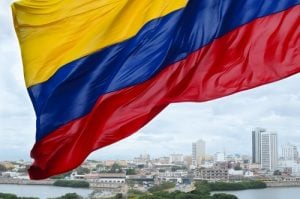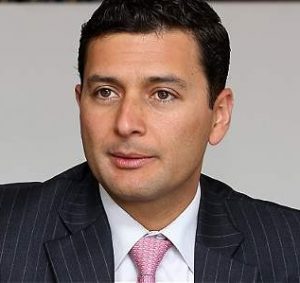Latest news about Bitcoin and all cryptocurrencies. Your daily crypto news habit.

Colombia’s top financial regulator published a circular about digital currency last week, naming bitcoin several times. Citing its potential risks, the authority clarified its stance on the cryptocurrency.
Also read: Colombia’s Poor Banking Infrastructure Great Potential for Bitcoin
Bitcoin in Colombia
 The Colombian government and central bank have made statements in the past about bitcoin, but no laws have been passed and a clear definition has yet to emerge of how the law treats bitcoin in the country.
The Colombian government and central bank have made statements in the past about bitcoin, but no laws have been passed and a clear definition has yet to emerge of how the law treats bitcoin in the country.
While Colombian banks have been restricted from handling it, the number of bitcoin users in the country has been growing substantially. At Localbitcoins, the weekly volume for Colombian pesos surpassed 2 billion, worth roughly $663,000 USD, for the first time at the end of May.
Head of the Financial Superintendency of Colombia, Jorge Castaño Gutiérrez, published a circular last week, clarifying the regulator’s stance on the digital currency.
Not Currency
Referencing past circulars, Gutiérrez reiterated that no digital currency has been recognized as currency by the legislator or the monetary authority. Citing Article 6 of Law 31 of 1992, he said Colombia’s only monetary unit and unit of account is the peso issued by Banco de la Republica.
In addition, Article 8 of the same law states that legal currency, which consists of banknotes and coins, must be expressed in the peso and “will be the only legal means of payment.” He described, “bitcoin is not an asset that can be considered a currency because it does not have the support of the central banks of any countries,” affirming that:
Bitcoin is not a currency of Colombia and, therefore, does not constitute a means of payment or legal tender.
Not Securities
Gutiérrez maintained that digital currencies do not have value under the capital markets reform bill, known as Law 964 of 2005, therefore they are not part of the Colombian securities market infrastructure. They do not constitute a valid investment and their operators are not authorized to advise and/or manage operations on them. He detailed:
This Superintendency has not authorized any supervised entity to guard, invest, broker or operate with such instruments, nor to allow the use of its platforms by the participants.
Unauthorized but Not Banned
 While digital currency is not banned in the country, the Superintendency reminded the general public in the circular that “it is up to each person to understand and assume the risks inherent in virtual currencies if they choose to deal with them, since they are not protected by any type of private or state guarantee,” Gutiérrez explained. “Its operations are also not eligible for coverage by deposit insurance.”
While digital currency is not banned in the country, the Superintendency reminded the general public in the circular that “it is up to each person to understand and assume the risks inherent in virtual currencies if they choose to deal with them, since they are not protected by any type of private or state guarantee,” Gutiérrez explained. “Its operations are also not eligible for coverage by deposit insurance.”
The circular reiterated that digital currency businesses are “not authorized to guard, invest, mediate or operate with these instruments, nor allow the use of their platforms to carry out operations with digital currency.”
Businesses that persist in using digital currencies are also urged to continue to apply adequate and sufficient measures to prevent them from being used as a tool for money laundering and the channeling of resources towards terrorist activities.
Ponzi Scheme Warnings
 The reason for such a strong position is the prevalence of investment scams in the region. The presence of many Colombian bitcoin-based Ponzi schemes prompted the Superintendency to warn the public about the risks of “bitcoin” and further prohibited banks from dealing with it earlier this year. Bitcoin.com has recently reported that nearby Bolivia has a similar problem with pyramid schemes masquerading as cryptocurrency investments.
The reason for such a strong position is the prevalence of investment scams in the region. The presence of many Colombian bitcoin-based Ponzi schemes prompted the Superintendency to warn the public about the risks of “bitcoin” and further prohibited banks from dealing with it earlier this year. Bitcoin.com has recently reported that nearby Bolivia has a similar problem with pyramid schemes masquerading as cryptocurrency investments.
In an interview with La.FM last week, Gutiérrez warned that pyramid schemes that use bitcoin to raise money from Colombians could face up to 20 years prison time. He detailed that these schemes have criminal consequences including imprisonment, both for those who organize these businesses and for those who promote them. He added that (loosely translated):
These schemes could have used the names of virtual coins to defraud the people.
What do you think of these clarifications? Let us know in the comments section below.
Images courtesy of Shutterstock, Colombia Central Bank, and El Tiempo
Need to calculate your bitcoin holdings? Check our tools section.
The post Colombia Clarifies Stance on Bitcoin appeared first on Bitcoin News.
Disclaimer
The views and opinions expressed in this article are solely those of the authors and do not reflect the views of Bitcoin Insider. Every investment and trading move involves risk - this is especially true for cryptocurrencies given their volatility. We strongly advise our readers to conduct their own research when making a decision.
